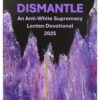Partner Organization Resources and Events
Each month ELCA Worship highlights resources and events from other organizations and institutions. These Lutheran and ecumenical partner organizations work alongside the ELCA to support worship leaders, worship planners, musicians, and all who care about the worship of the church. Lutheran Summer Music Academy & Festival Transforming and connecting lives through faith and music since 1981. Lutheran Summer Music 2025 Valparaiso University,Valparaiso, Ind. June 22–July 20 Grades 8-12 | Learn more: LAST CALL for LSM 2025! Enrollment for this summer is over 80% full, but there’s still time for young musicians to apply and for you to nominate students. Lutheran…
Index of the March 2025 Issue
Issue 98 of Administration Matters 2025 ELCA Churchwide Assembly The 2025 ELCA Churchwide Assembly will take place July 28–Aug. 2 in Phoenix, Ariz. Under the theme “For the Life of the World,” the assembly will meet around word and water, wine and bread, to carry on its work on behalf of the entire church. Key actions during the assembly will be electing a new presiding bishop and secretary, considering a new social statement on civic life and faith, edits to the social statement Sexuality (2009) and recommendations from the Commission for a Renewed Lutheran Church. Live video of worship and…
For what shall we pray?
“For what shall we pray?” is a weekly post inviting individuals, groups, and congregations to lift up our world in prayer. This resource is prepared by a variety of leaders in the ELCA and includes prayer prompts, upcoming events and observances, and prayer suggestions from existing denominational worship materials. You are encouraged to use these resources as a starting point, and to adapt and add other concerns from your local context. More information about this resource can be found here. Prayer prompts: For areas of the world impacted by ongoing war, conflict, and violence, especially Ukraine, Palestine, and South…
March 16, 2025–Confession and Protest
Catalyst Question What words come to mind when you think of Lent? Confession and Protest In Luke 13:31-35, we hear Jesus lament about Jerusalem. It’s quite an odd thing for the Messiah of Israel to lament about Israel’s capital. How strange for the Son of God to weep over the city of God. Yet, it’s Jesus’ love for Jerusalem, for God, and for God’s people that leads him to cry out. Simply put, Jesus is saying that Jerusalem is not living up to its promises. Rather than be a city where the voice of God is welcome, the religious leaders…
Mud on my Boots on Ash Wednesday
Cleaning the mud off my boots after a recent flood response, I noticed the grittiness of it. It reminded me of preparing the ashes for Ash Wednesday. Burning last year’s celebratory palms, sieving them fine, mixing them with oil. I see the impermanence of things, of even life itself, in the mud and ashes. Ash Wednesday, a day when we acknowledge our mortality and our own return to dust. Mucking out after a flood, removing what was once treasure that has now become trash. Too often we overlook the physicality of the Christian faith in our anticipation of Heaven. We…
For what shall we pray?
“For what shall we pray?” is a weekly post inviting individuals, groups, and congregations to lift up our world in prayer. This resource is prepared by a variety of leaders in the ELCA and includes prayer prompts, upcoming events and observances, and prayer suggestions from existing denominational worship materials. You are encouraged to use these resources as a starting point, and to adapt and add other concerns from your local context. More information about this resource can be found here. Prayer prompts: For areas of the world impacted by ongoing war, conflict, and violence, especially Ukraine, Palestine, Myanmar, and South…
The Early Aristotelianization of Reformed and Lutheran Theology
Barth on the stillbirth of the Protestant Reformation. He underscores a reality that I have been, we have been writing about for years, in regard to the scholasticism Reformed and Lutheran. That is to note, the reception of the Aristotelian mantle that had, ironically, brought to formation the very Church, and her doctrina, that Luther was seeking to reform. Unfortunately, very early on in the second and third generation reformers (on both the Reformed and Lutheran sides) imbibed the theological categories that had originally led to the status of the Roman Church that Luther and others believed needed to be…
Available NOW: DISMANTLE: An Anti-White Supremacy Lenten Devotional
Dismantle: An Anti-White Supremacy Lenten Devotional This devotional was created in response to the call of the 2019 Churchwide Assembly to condemn white supremacy and racist rhetoric. As you journey through Lent, this resource will challenge you and bring you closer to the radical neighbor-love that Christ demands in the Gospels. DOWNLOAD | DESCARGAR ELCA Blogs
SPPO Spotlight: Inspired by Intersectionality
By Solveig Muus, Director, Lutheran Advocacy Ministry Arizona Lately I’ve been thinking about the many ways our Church intersects across so many different channels, and about how that intentional intersectionality benefits the whole. ELCA-affiliated state public policy offices (sppos), like Lutheran Advocacy Ministry Arizona (LAMA), are one of those channels. I’m privileged to serve on the planning teams for this year’s sppo retreat as well as the ELCA World Hunger Leaders Gathering. In these settings and others, I’ve heard Christians in the ELCA passionate about the ways in which we, as Lutherans, connect people to create possibilities. Below is just…
God’s Freedom, Goodness and Necessity in Philosophical and Theological Convivium
More thoughts on the properties of God for my philosophy of religion class. As I have been responding, this week, surrounding God’s omniscience, eternality freedom, goodness, and necessity. These are my last three responses. What is freedom? Does it make sense to talk about maximal or perfect freedom? If yes, how should this be defined? If not, why not? Do you agree that the ability to do what is morally wrong is a power for human beings but a liability for God? Answer the question by laying out the argument for this as you understand it, or asking any questions…







